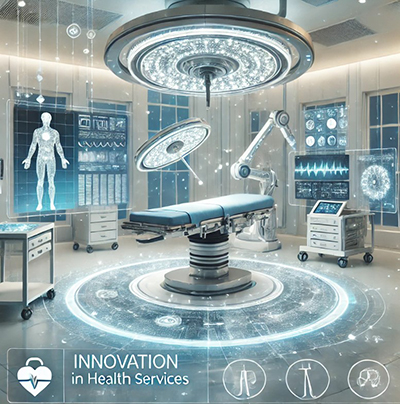Innovation in Health Services
The healthcare industry is undergoing a dramatic transformation, driven by innovation in technology and service delivery. From advanced diagnostic tools to personalized treatment plans, the integration of cutting-edge solutions is revolutionizing the way health services are provided. This article explores the innovations shaping the future of healthcare, focusing on their impact, benefits, and challenges.

The Role of Technology in Modern Healthcare
Technology has become a cornerstone in the delivery of effective and efficient health services. Innovations such as artificial intelligence (AI), telemedicine, and wearable devices are making healthcare more accessible and tailored to individual needs. For instance, AI-powered diagnostic tools can analyze medical images with remarkable accuracy, aiding in early detection of diseases such as cancer.
Telemedicine: Bridging Gaps in Care
Telemedicine has emerged as a game-changer, especially in remote and underserved areas. Patients can consult doctors through video calls, access prescriptions online, and monitor their health using smartphone apps. This not only reduces the burden on healthcare facilities but also ensures timely medical attention, saving lives in critical situations.
Wearable Technology and Health Monitoring
Wearable devices like smartwatches and fitness trackers are empowering individuals to take charge of their health. These devices monitor vital signs such as heart rate, blood pressure, and oxygen levels, providing real-time data to users and healthcare providers. This proactive approach enables early intervention, improving overall health outcomes.
Advanced Diagnostics and Treatment
Innovation in diagnostic tools is paving the way for early and accurate disease detection. Technologies like genomics, robotics, and 3D printing are enhancing diagnostic precision and treatment efficacy.
Genomics and Personalized Medicine
Genomic research has unlocked the potential for personalized medicine, where treatments are tailored to an individual’s genetic makeup. This approach is particularly effective in managing chronic conditions and rare diseases, offering targeted therapies with fewer side effects.
Robotics in Surgery
Robotic-assisted surgeries are setting new benchmarks in precision and minimally invasive procedures. Robots like the da Vinci Surgical System allow surgeons to perform complex operations with enhanced accuracy, reducing recovery times and improving patient outcomes.
3D Printing in Healthcare
3D printing technology is transforming prosthetics, implants, and even organ transplantation. Customized prosthetics and bio-printed tissues are improving the quality of life for patients, showcasing the potential of this groundbreaking innovation.
Digital Health Records and Data Analytics
The digitization of health records is streamlining healthcare management. Electronic Health Records (EHRs) enable seamless sharing of patient information among healthcare providers, ensuring coordinated and efficient care.
Big Data in Healthcare
Big data analytics is playing a crucial role in identifying trends, predicting outbreaks, and improving patient care. By analyzing vast amounts of health data, healthcare providers can make informed decisions, enhance operational efficiency, and reduce costs.
Artificial Intelligence and Predictive Analytics
AI-driven predictive analytics is helping healthcare providers anticipate patient needs and optimize treatment plans. For example, predictive models can identify patients at risk of readmission, enabling preventive measures to improve outcomes.
Enhancing Patient Experience
Patient-centered care is at the heart of healthcare innovation. Technologies like virtual reality (VR), augmented reality (AR), and chatbots are enhancing the patient experience by providing immersive education, reducing anxiety, and offering round-the-clock assistance.
Virtual and Augmented Reality
VR and AR are being used for pain management, rehabilitation, and medical training. For instance, VR can distract patients during painful procedures, while AR assists surgeons by overlaying critical information during operations.
Chatbots and Virtual Assistants
AI-powered chatbots are transforming patient engagement by answering queries, scheduling appointments, and providing medication reminders. These virtual assistants are making healthcare more accessible and convenient.
Challenges and Ethical Considerations
While innovation brings numerous benefits, it also poses challenges and ethical concerns. Issues such as data privacy, cybersecurity, and the digital divide need to be addressed to ensure equitable and secure access to healthcare.
Data Privacy and Security
The increasing reliance on digital tools raises concerns about the protection of sensitive patient information. Healthcare organizations must invest in robust cybersecurity measures to safeguard data from breaches and unauthorized access.
Addressing the Digital Divide
Not all patients have equal access to digital health solutions. Bridging the digital divide requires investment in infrastructure, education, and affordable technology to ensure inclusive healthcare.
Ethical Implications of AI
The use of AI in healthcare raises ethical questions about decision-making, accountability, and potential biases. Establishing clear guidelines and oversight is essential to ensure the responsible use of AI technologies.
The Future of Healthcare Innovation
The future of healthcare lies in the integration of emerging technologies and patient-centric approaches. Innovations such as blockchain for secure health records, nanotechnology for targeted drug delivery, and bioprinting for organ transplantation hold immense promise.
Blockchain for Health Records
Blockchain technology can provide a secure and transparent platform for managing health records, ensuring data integrity and patient privacy. This decentralized system has the potential to transform healthcare data management.
Nanotechnology in Medicine
Nanotechnology is revolutionizing drug delivery by enabling targeted treatment at the cellular level. This precision medicine approach minimizes side effects and enhances therapeutic outcomes.
Bioprinting and Regenerative Medicine
The development of bioprinting technology is paving the way for creating functional tissues and organs. This innovation could address the global shortage of organ donors, saving countless lives.
Conclusion
Innovation in health services is reshaping the landscape of healthcare, making it more accessible, efficient, and patient-centered. While challenges exist, the potential benefits far outweigh the risks. By embracing these advancements responsibly, we can build a healthier future for all.